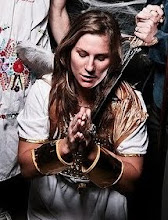Happiness Happens, Actually
Actually sat down for tea, but ended up having rice liquor. She preferred
tequila to both, but took what she could get—you know, he was paying.
She thought, I see no ‘tea for two,’ as promised, and that she’d rather date a
guy with pretty blue eyes because they seemed more “angelic,” but it was—
an annoyance in spite of good looks.
Actually knew better than to answer the call of a blind date and a friendly nudge.
But, here she was, sitting in a clown suit—a tribute to Halloween ‘08
and a week of build up—entertaining thoughts of fucking a stranger
just because and fingering her sake cup erotically.
If this clown suit gets me laid, there is no greater God than Desperation.
And if this guy pushes his glasses up his nose one more time…
Actually wanted to punch him.
Guy made obvious attempts to bridge the gap and distort the awkward silence.
His voice cracked: “You’re a cancer, aren’t you?”
Guy was avoiding the obvious—an avoidance too unreal for Actually.
She took off her red nose and squeezed it, making a fist.
“What about me seems so much like a Cancer, Guy?”
Guy, startled, index-fingered his glasses till they were flush with his ‘brows.
His hand darted for his expensive apple-flavored sake.
Fucking nerd. Maybe his dick is big. Might be this fucker’s only saving grace.
Guy’s lips tightened, reaching sideways and skyward: “Excuse me. That was tangy.”
“No worries.” Actually, taunting a Russian accent, eyed Guy flirtatiously.
“Well, I’m embarrassed. I admit—I don’t know why I said that.”
Actually was a Leo and, at that very moment, started thinking “lesbian” was
the way to go. She lit a cigarette and mentally memo-ed.
Note to Self.
But, alas, she had already been down that road—and pussy hadn’t really spun her skirt.
Actually’s doubts were suddenly slighted by invasive twinges of compassion. Out of nowhere, she felt like doing someone else a favor.
She imagined she would fuck him in the best way possible. She would build him up “hard” and let him down “easy.”
While her short-spurted fantasies played out, she felt herself becoming wet.
“Could it be my unruly appearance and soft pink core?”
40—love.
Actually uncrossed her legs and, with the precision of a beach volleyball nailing the sand, farted.
Her calculations, like two-faced bitches, had turned against her. She was beat-red with embarrassment. Beneath the ludicrous and vindictive veneer of face paint, a semblance of humility began to surface.
Now, it was she who was squirming. She could no longer meet Guy’s once darting eyes with such prowess and strength. She was no longer the beast in the jungle.
And then, for the first time all night, Guy scooted his chair close, leaned forward, and met, what he’d later call, her “fortuitous look of consternation” with the same sassiness she’d had.
He cleared his throat: “You know, I’ve never smashed a clown before.”
And then, for the first time in a long time, it happened—happiness happened. Her once frozen, brokeback mountain heart had been surprised off its high horse just long enough to thaw.
It was then, during the April of those unexpected happenings, that Actually was able to love again.
